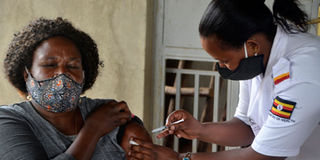Ugandan nurses persevere at their posts amid Covid-19 hardships

A Ugandan nurse administers a Covid-19 vaccine to a teacher at a health center in Kampala, capital of Uganda, March 31, 2021. (NICHOLAS/KAJOBA/XINHUA)
What you need to know:
- Justus Cherop Kiplangat, president of the Uganda Nurses and Midwives Union, told the media that, although many nurses and midwives work under terrible conditions, they still continue to provide health care.
Violet Ayesiza, 32, works as a nurse at Kasangati Health Center in the central Ugandan district of Wakiso. Now she has to work for more than 12 hours a day before she is relieved by her colleagues.
She is among more than 70,000 registered nurses and midwives in the country to serve a nationwide population of 45 million people, as the world commemorates International Nurses Day on Wednesday.
In an interview with the media before International Nurses Day, Ayesiza said she was overwhelmed with work, like many other nurses and midwives in Uganda who were staying at their posts amid the heavy workload brought by the Covid-19 pandemic.
Despite the increased workload, she continues to serve diligently and professionally, she said. International Nurses Day falls on May 12 to mark the crucial work of nurses. Since Uganda reported its first Covid-19 case in March last year, its health facilities have been flooded by patients, some infected with Covid-19 and some with other ailments.
"The number of people who come to receive treatment for ailments has now even doubled compared before the outbreak (of Covid-19). Many people are now seeking the services of health workers at the facility," Ayesiza said.She said that her health center now treats between 100 to 200 patients in a single day.
Teopista Asimwe, another nurse, said that despite the meagre pay, they still stay at their posts to provide health care to the people who come to the health center."We have few nurses and midwives providing prenatal, delivery, and postnatal services. Being a health facility that's within the town center, we end up providing delivery and postnatal services, including family planning and immunizations," said Asimwe."The workload is heavy and we sometimes need extra hands, especially on peak days," said the nurse.
Juliet Nalwanga, a 25-year-old mother of two, said she was happy because she at least got the health care provided by the nurses and midwives.
"The nurses here are friendly and I feel happy whenever I come here to immunize my children, although sometimes the health center is filled with many people, especially during these pandemic periods," Nalwanga said at Goma Health Center in the central district of Mukono.
Justus Cherop Kiplangat, president of the Uganda Nurses and Midwives Union, told the media that, although many nurses and midwives work under terrible conditions, they still continue to provide health care.
Kiplangat said many health workers do not have decent accommodation and some live far away from their workplaces.
The Ugandan government in May 2018 pledged to increase the wellbeing of nurses and midwives, including increasing their lunch allowance. But the government reportedly failed to fulfil the pledge, which forced nurses and midwives to stage a sit-down strike several days ago. Ugandan government officials said the pandemic had changed the government's priority for funding allocations.
Robinah Nabbanja, minister of state for health in charge of general duties, told Xinhua that once the pandemic slows down, the medical workers would be the priority. "My advice to nurses and midwives is to remain working as the government looks for funds to fulfil its promise," she said.
David Karubanga, minister of state for public service, told reporters that the leadership of the Nurses and Midwives Union had reached a consensus with the government over the payment of their lunch allowance.





